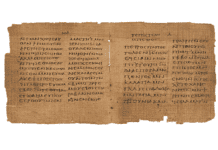In 2018, he warned that a deal between the Vatican and China that cedes too much authority to Beijing would place the country’s Catholic followers in a big “birdcage.”
“The Communist government just wants the church to surrender, because they want complete control, not only of the Catholic Church but all the religions,” Zen said at the time.
A tacit agreement was reportedly reached in 2018 whereby China submitted names to the Vatican for approval, but that has had little perceptible impact on relations between the sides. Zen accused the Holy See of selling out underground Catholics who have remained loyal to the Vatican.
Zen, a frequent blogger, posted about making a desperate journey to Rome in a personal effort to prevent an underground bishop from being replaced by an excommunicated one favored by Beijing.
The Vatican spokesman, Matteo Bruni, said Wednesday the Holy See “learned with concern the news of the arrest of Cardinal Zen and is following the evolution of the situation with extreme attention.”
The Hong Kong Catholic Diocese also issued a statement Thursday saying it was “extremely concerned” about Zen’s condition and safety.
“We have always upheld the rule of law. We trust that in the future we will continue enjoying religious freedom in Hong Kong under the Basic Law,” it said, referring to the city’s mini-constitution.
Zen has outsized political clout in a city where Christians are a minority but many hold elite positions, particularly in government and education.
Born into a Catholic family in Shanghai in 1932, Zen left for Hong Kong, then a British colony, in 1948, a year before the Communist takeover of the mainland.
In 1989, when Zen and others in Hong Kong watched student-led pro-democracy protests unfold in China before a brutal military crackdown in Beijing’s Tiananmen Square left many dead.
He adopted an activist role after he was appointed Hong Kong’s junior bishop in 1996, the year before Britain handed control of the city to Beijing. He frequently drew the wrath of China’s Communist leaders, who called him a “Vatican agent.”
Zen backed the city’s pro-democracy movement and was an outspoken critic of proposed anti-subversion legislation that officials were forced to shelve. He went on a three-day hunger strike to protest a government plan to curtail the influence of churches in publicly funded schools.











